San Francisco, California – The national confrontation between janitors and some of the world’s richest property owners has arrived in San Francisco where, on Wednesday, over two thousand building cleaners shut down the city’s main artery, Market Street, in a huge march. Later, twenty-seven workers and supporters were arrested in a financial district intersection as they blocked it in an act of civil disobedience.
Among the many banners carried by the marchers, by far the most common was one that said, “We Are Ready to Strike the 1%.” It clearly summed up workers’ anger, which made this march even larger than one three days earlier and others organized during the weeks prior.
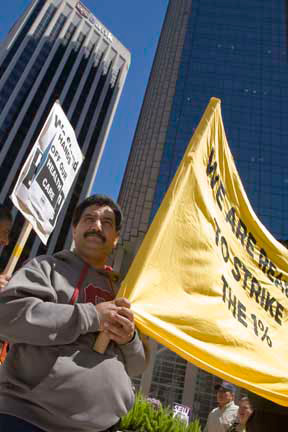 (Photos by David Bacon)A strike is on the near horizon in San Francisco, according to Olga Miranda, president of Service Employees Local 87, one of the oldest janitors’ unions in the country. “Our members are determined to go on strike and we’ve already called for a strike vote,” she shouted over the chants of marchers. “They’re telling us the union must lead and going on strike is our recommendation.”
(Photos by David Bacon)A strike is on the near horizon in San Francisco, according to Olga Miranda, president of Service Employees Local 87, one of the oldest janitors’ unions in the country. “Our members are determined to go on strike and we’ve already called for a strike vote,” she shouted over the chants of marchers. “They’re telling us the union must lead and going on strike is our recommendation.”
The local already took a vote to authorize a strike when its contract expired on July 31 with the city’s main building service employers, Able Building Maintenance, American Building Maintenance and the San Francisco Contractors Association. That was fine with janitor Mohamed Ismael, who said, “A strike is possible. We don’t like to go on strike, but if they don’t make a reasonable proposal, if they tell us this is what you’re going to get, if we go to the end of the line, then it’s better for us to go on strike.”
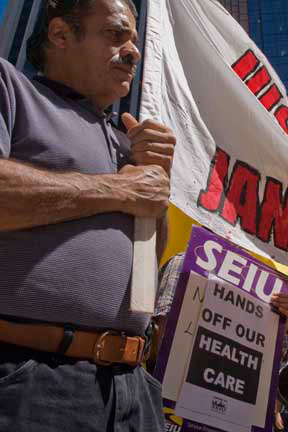 At issue in San Francisco is the same sticking point in most union contract negotiations – health care costs and wages. San Francisco janitors are the second most highly paid in the country, after New York City, but the city’s living costs are so high that few can afford to live there. Ismael was fortunate enough to find affordable housing in the city 20 years ago. But now, the contractors are demanding that workers pay $600 a month for family health care coverage and he has a wife and four children. They offer a raise of 50¢ an hour, which would total about $85, resulting in an effective wage cut of $515 a month.
At issue in San Francisco is the same sticking point in most union contract negotiations – health care costs and wages. San Francisco janitors are the second most highly paid in the country, after New York City, but the city’s living costs are so high that few can afford to live there. Ismael was fortunate enough to find affordable housing in the city 20 years ago. But now, the contractors are demanding that workers pay $600 a month for family health care coverage and he has a wife and four children. They offer a raise of 50¢ an hour, which would total about $85, resulting in an effective wage cut of $515 a month.
“If they do this, there is no way I could live as a human being in San Francisco,” Ismael said. “I would have to leave.”
Miranda claims bitterly “they’re forcing families out of their homes. We have these benefits because our union has been here for 78 years. We’re saying, don’t take away what we already have. They’re offering 50¢ and they have revenues of millions. We absolutely cannot afford to pay this.”
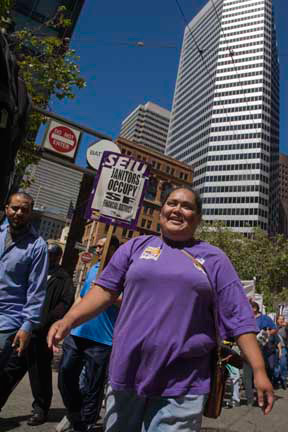 Olga Miranda, president of Service Employees Local 87.Ismael works at Embarcadero Center 4, one of four huge office and retail buildings on the San Francisco waterfront owned by Boston Properties, which reported total revenue of $1.7 billion in 2011.
Olga Miranda, president of Service Employees Local 87.Ismael works at Embarcadero Center 4, one of four huge office and retail buildings on the San Francisco waterfront owned by Boston Properties, which reported total revenue of $1.7 billion in 2011.
At night, the buildings are outlined in lights, a signature element of the city skyline. Inside, Ismael runs floor polishers and cleaning equipment, empties waste baskets and washes down bathrooms for Able Building Maintenance, his direct employer and the company with the cleaning contract for 4 Embarcadero Center.
But the real wealth and power in relation to the janitors belongs to Boston Properties and other real estate investment groups. They dictate the terms of the contracts for cleaning the offices of their tenants, another extremely wealthy group that includes banks like Wells Fargo and other major corporations. Nevertheless, cleaning contractors are hardly mom-and-pop operations and haven’t been for decades. They’re large corporations themselves. Able and its main San Francisco rival, ABM, clean buildings for real estate trusts throughout the US and all over the world.
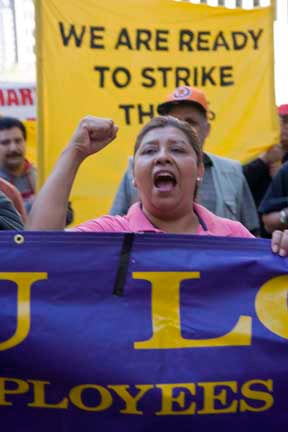 As their banner says, janitors are up against the 1%, whether they’re direct employers or the financial interests behind them.
As their banner says, janitors are up against the 1%, whether they’re direct employers or the financial interests behind them.
Warren Delahoussaye works at 50 California Street, a tall office building owned by Shorenstein, whose founder Walter Shorenstein started the San Francisco office property boom decades ago. This trust is now the biggest player in the city’s commercial real estate market and has expanded to own buildings around the country. The Shorenstein real estate portfolio now tops $6 billion. “These corporations and the wealthiest 1% whose offices and buildings we clean, can afford to do right by San Francisco families,” Delahoussaye said.
If San Francisco’s 3,000 union janitors go on strike, it will be the first time since 1996 and the largest janitorial strike since the huge Los Angeles walkout of 2000. The other big janitors’ local in California, United Service Workers West, almost struck over similar employer demands when its contracts expired April 30, which cover 10,000 members in the East Bay, Silicon Valley, Sacramento, Los Angeles and Orange County. After marches and civil disobedience agreements were settled in June.
In July, however, janitors went on strike in Houston, where the Service Employees union only signed a first contract six years ago, also as a result of a strike. This year, Houston’s oil and bank interests and the contractors working in their buildings proposed to increase the base hourly wage of $8.35 by fifty cents in raises to be spread over five years. ABM is a major employer in Houston, as it is in San Francisco, and the same 50¢ offer showed up on the bargaining table in both places. In Houston, however, janitors, still only have health coverage for individual workers, not their families. Many make an average of less than $10,000 a year because they can’t work enough hours to earn more. They’re demanding a $10/hour minimum wage and more working hours to raise their overall income.
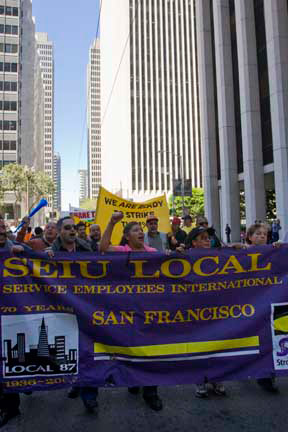 Five hundred of the union’s 3,200 members are on strike. Since negotiations hit the rocks, Houston intersections, too, have been blocked by supporters in acts of civil disobedience. In the strike’s second week, the union called on other janitors’ locals around the country to mount one-day work stoppages in solidarity and cleaners then walked out of buildings in New York, California, Illinois, and other states.
Five hundred of the union’s 3,200 members are on strike. Since negotiations hit the rocks, Houston intersections, too, have been blocked by supporters in acts of civil disobedience. In the strike’s second week, the union called on other janitors’ locals around the country to mount one-day work stoppages in solidarity and cleaners then walked out of buildings in New York, California, Illinois, and other states.
San Francisco has the hottest commercial real estate market in the country. Despite foreclosures on the homes of workers and thousands of working-class homeowners in the Bay Area under water because their homes are now worth less than their loans, the prices of city office buildings continues to go up. And they are selling. The corporate tenants as well are recording large profits.
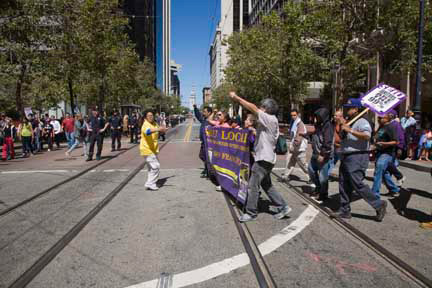
One union study, “How Much is The 1% Holding Back Your Family,” argued that corporations with California headquarters have cash reserves of $500 billion. The Federal Reserve said that the cash reserves of US corporations have more than doubled since 2000, including during the years of the current economic crisis.
“It’s ridiculous in a city where the market is continuing to grow and companies have so much cash that janitors are expected to pay $600 more for their healthcare,” Miranda charged. Nevertheless, no progress was reported in negotiations the night before the latest San Francisco march and no new sessions are scheduled. In the media, contractors’ association negotiator Jim Beard said employers were negotiating in good faith.
A strike is now looming in San Francisco.
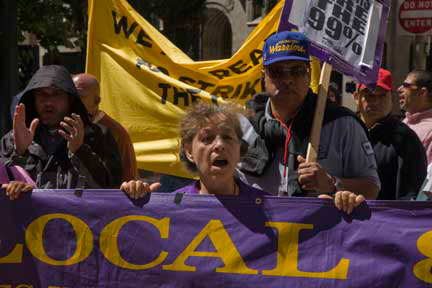
Thank you for reading Truthout. Before you leave, we must appeal for your support.
Truthout is unlike most news publications; we’re nonprofit, independent, and free of corporate funding. Because of this, we can publish the boldly honest journalism you see from us – stories about and by grassroots activists, reports from the frontlines of social movements, and unapologetic critiques of the systemic forces that shape all of our lives.
Monied interests prevent other publications from confronting the worst injustices in our world. But Truthout remains a haven for transformative journalism in pursuit of justice.
We simply cannot do this without support from our readers. At this time, we’re appealing to add 50 monthly donors in the next 2 days. If you can, please make a tax-deductible one-time or monthly gift today.
